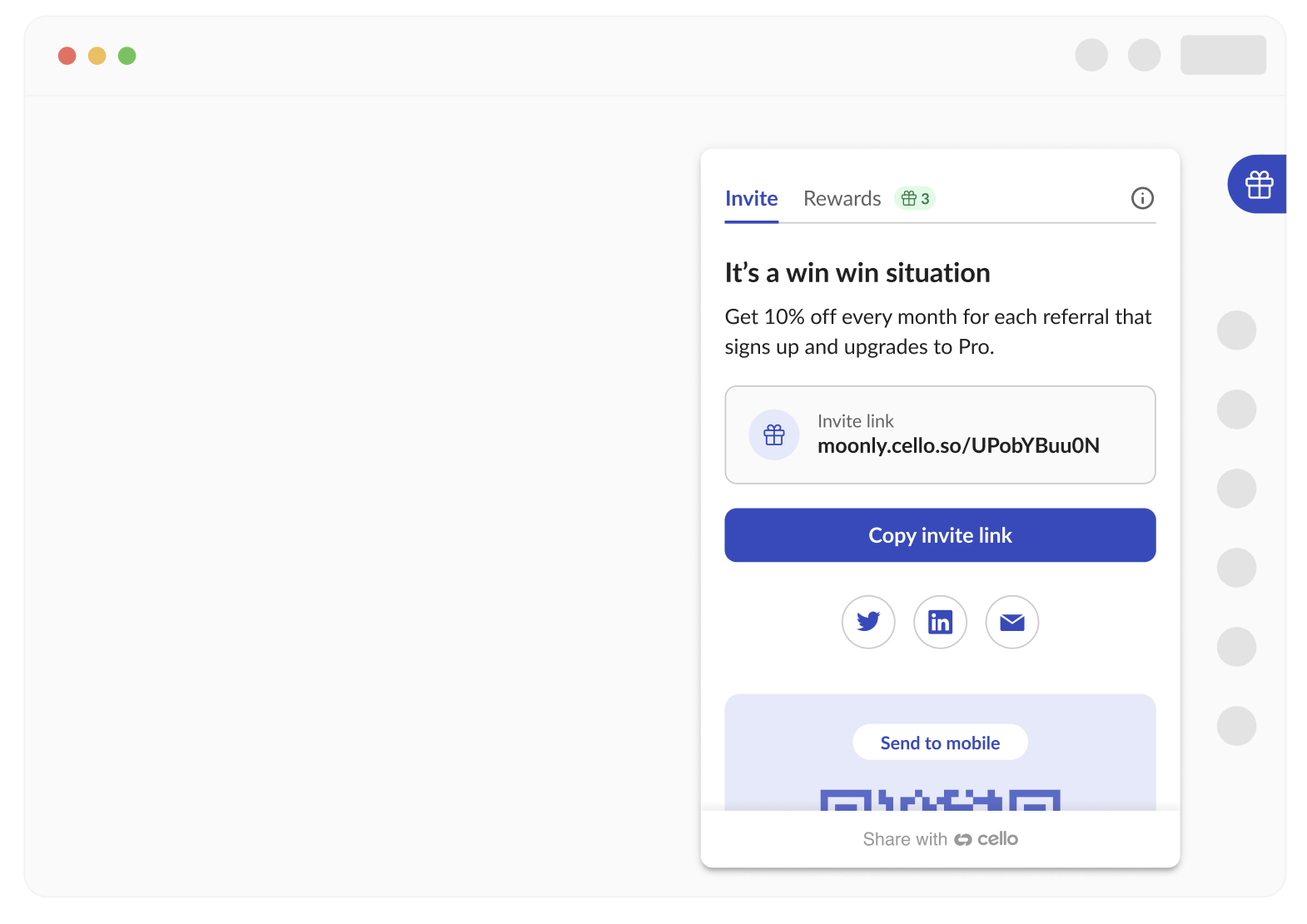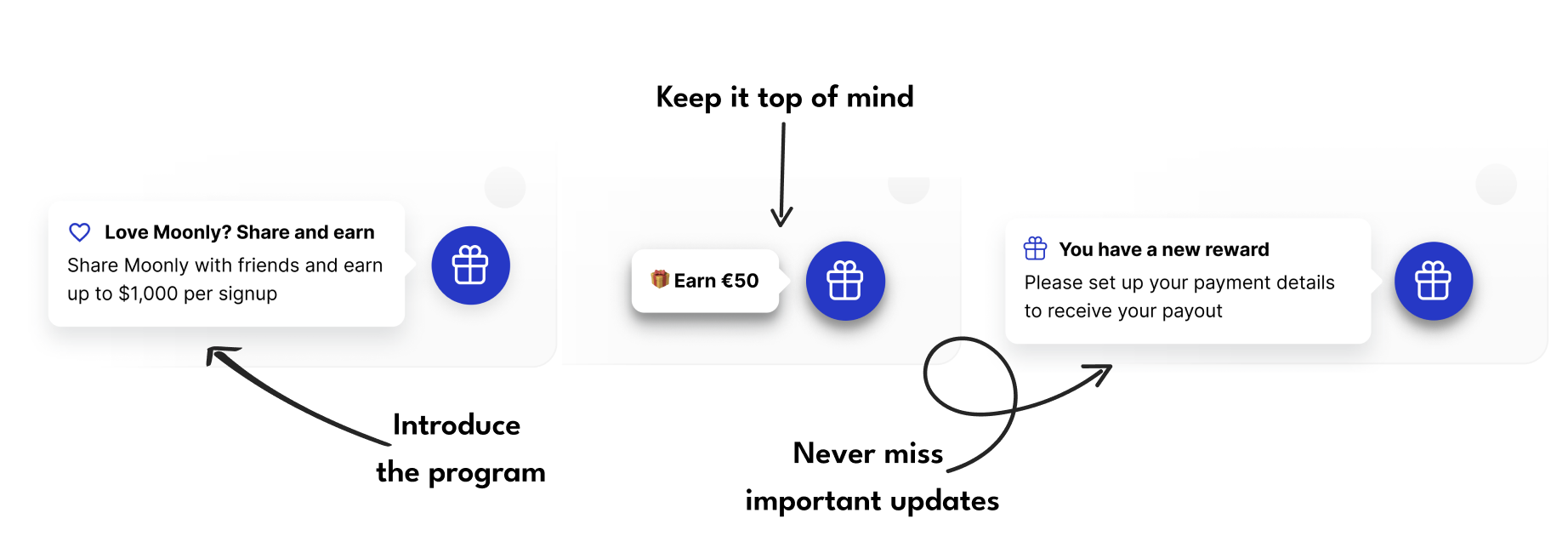If you’re deciding between Cello and FirstPromoter for referrals, this page gives a practical comparison to help you choose. You’ll find what you need to build for each option and the trade‑offs across attribution reliability, in‑app UX, notifications, campaigns, and payouts.
Cello embeds a native referral component, coordinates in‑app + email journeys, and uses server‑side attribution via Stripe and webhooks. FirstPromoter provides a tracking snippet and hosted affiliate portal; teams typically build or embed the user experience themselves.
Overview
- In‑product referral UI: Cello provides a native in‑app referral panel for web and mobile; users see their link, status, and rewards inside your app.
- Affiliate portal model: FirstPromoter centers on a JavaScript tracking snippet (
fpr.js) and a hosted portal; there is no pre‑built in‑app referral panel.
Integration and UX embedding
| Topic | Cello | FirstPromoter |
|---|
| Referral UI embedding | Native Referral Component; in‑app panel shows link, status, rewards. | JS tracking snippet; no embedded referral widget. Affiliate UI is hosted externally or embedded via iframe. |
| Custom launcher / placement | Custom Launcher to open panel from any UI element with full styling control. | No equivalent launcher pattern; developers wire UI to APIs or redirect to hosted pages. |
| Branding & control | Inherits your design system; theming is automatic. | Branding primarily on the hosted portal or via white‑label settings. |
Example
Open Cello’s referral panel from a profile menu item; keep the experience fully in‑app and on‑brand.

Notifications and engagement
Cello includes an in‑app and email notification system for referral programs:
- In‑app alerts and badges: e.g., an alert under a “Rewards” tab and a badge on the launcher when a reward is earned.
- Announcements (callouts): prompts for next actions such as adding payout details after earning a reward.
- Email notifications: lifecycle emails at moments like welcome, first share, reward earned, and unclaimed reminders.
- Journey logic: behavior‑based timing (e.g., alert now, then announcement after 7 days if no action).
 FirstPromoter offers email notifications and webhooks for events. There is no native in‑app notification layer; teams implement journeys via external tooling, requiring additional development effort.
FirstPromoter offers email notifications and webhooks for events. There is no native in‑app notification layer; teams implement journeys via external tooling, requiring additional development effort.
Mobile SDKs
| Topic | Cello | FirstPromoter |
|---|
| Native mobile SDKs | iOS, Android, and React Native SDKs with a plug‑and‑play referral component. | No native mobile SDK; web‑first via JavaScript (fpr.js) and REST API/webhooks. |
| Integration pattern | Quick install (SPM/CocoaPods/Gradle). Initialize with product ID/user token; supports custom launchers and native share sheets. | Mobile apps embed a web view/portal or build custom flows against the REST API and webhooks. |
| In‑app referral UI | Embedded panel inside the mobile app; users copy links, view progress, manage rewards natively. | No pre‑built in‑app panel; experiences are web/portal‑based or custom‑built. |
| Payout support | Platform includes automated payouts and KYC compliance (outside SDK code). | Payouts handled externally via dashboard/API; not native to the mobile app. |
If you need native, in‑app referral UX on iOS/Android with minimal build, Cello’s SDKs provide a faster path. FirstPromoter requires custom mobile implementation or redirecting to a web portal.
Attribution: client vs server flow
| Topic | Cello | FirstPromoter |
|---|
| Tracking model | Backend‑centric attribution using secure IDs and event webhooks (e.g., Stripe). No reliance on cookies or client scripts. | Client‑side cookie tracking by default (_fprom_ref, _fprom_tid). API‑only mode exists but requires custom setup. |
| Conversion flow | Ties referrals to backend payment events via Stripe metadata (cello_ucc, new_user_id) or API payloads. Deterministic even in blocked/mobile contexts. | Attributes sales by matching customer emails from client‑recorded leads to billing events; sensitive to missing cookies or mismatched emails. |
| Resilience | Works in privacy‑restricted or JS‑disabled environments; ideal for mobile, embedded, or secure checkout flows. | Dependent on browser state; cookie‑less or JS‑restricted scenarios require custom logic. |
In environments with strict CSP, script blockers, mobile apps, or server‑rendered checkouts, server‑first attribution reduces reliance on client events. FirstPromoter can be configured via API but requires additional work.
Campaigns, rewards, and payouts
Campaign design and reward rules
| Aspect | Cello | FirstPromoter |
|---|
| Campaign flexibility | Multi‑condition campaigns (percentage, fixed, discount) within one rule set. | One primary reward per campaign; advanced structures require manual setup. |
| Double‑sided | Native friend incentives (“give X,getY”) built into campaign logic. | Implemented via coupon codes synced with Stripe; manual configuration required. |
| Recurring rewards | Recurring rewards with configurable caps per campaign. | Recurring commissions supported; limits are defined per campaign manually. |
| Computation | Reward logic executed server‑side; rewards auto‑registered via events. | Tracked on client lead creation; resolved by matching purchase webhooks. |
Payout management
| Aspect | Cello | FirstPromoter |
|---|
| Fulfillment | Automated reward registration and payout initiation. | Aggregates commissions; payouts executed manually or via PayPal API. |
| User experience | Users select payout method (e.g., PayPal, Venmo) inside your application. | Payouts managed on the hosted portal; not within your product UI. |
Summary: key differences
- In‑app referral UX vs portal: Cello provides a native embedded panel; FirstPromoter uses a hosted affiliate portal and snippet.
- Engagement: Cello offers in‑app + email journeys; FirstPromoter relies on email and webhooks with no in‑app layer.
- Attribution: Cello is server‑first via metadata/webhooks; FirstPromoter defaults to client cookies and email matching.
- Campaigns: Cello supports multi‑type and double‑sided rewards in one campaign; FirstPromoter is more single‑reward oriented.
- Payouts: Cello manages payouts inside your app; FirstPromoter manages payouts externally.
- Mobile SDKs: Cello offers native iOS/Android/React Native SDKs with a plug‑and‑play component; FirstPromoter has no native mobile SDK and is web‑first.
Select the option that fits your integration model (in‑app vs portal), attribution requirements (server‑side vs client‑side), and operational preferences (built‑in journeys vs custom tooling). 
 FirstPromoter offers email notifications and webhooks for events. There is no native in‑app notification layer; teams implement journeys via external tooling, requiring additional development effort.
FirstPromoter offers email notifications and webhooks for events. There is no native in‑app notification layer; teams implement journeys via external tooling, requiring additional development effort.